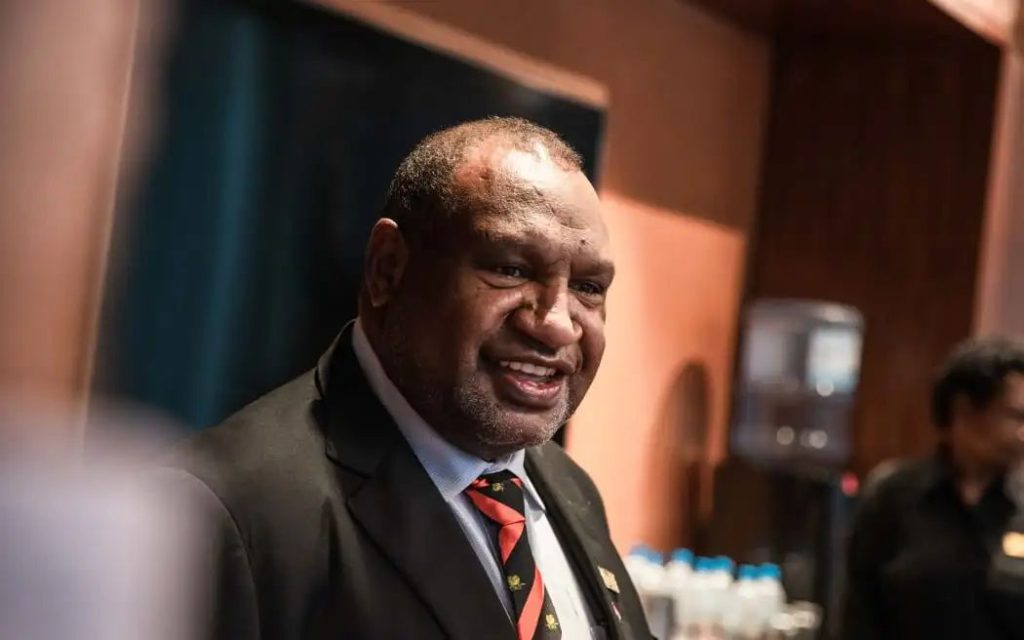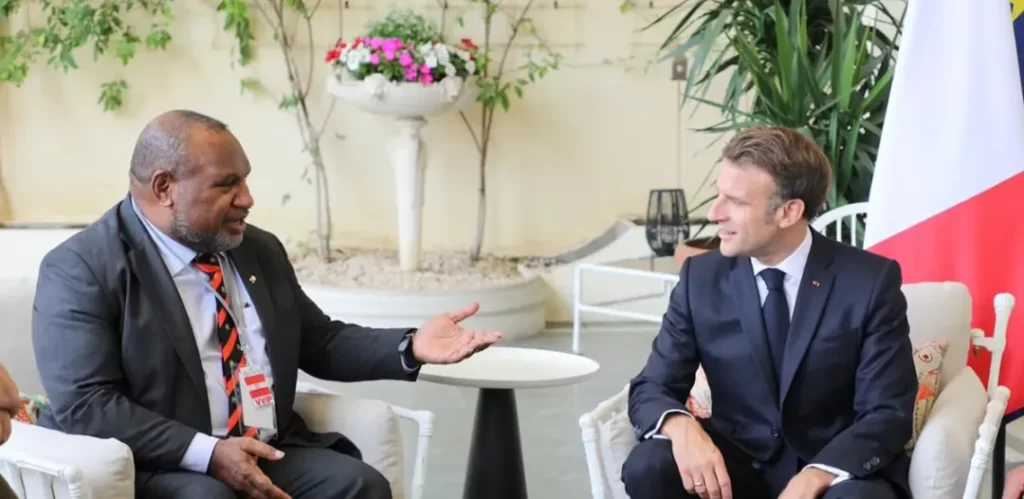During the 3rd United Nations Ocean Conference held in Nice, France, Prime Minister of Papua New Guinea James Marape held a bilateral meeting with French President Emmanuel Macron, marking a new phase of deepening relations between the two countries.
Prime Minister Marape highly praised the meeting, describing it as “one of Papua New Guinea’s most meaningful international engagements in recent years.” He noted that as a permanent member of the UN Security Council and a key member of the G7 and G20, France is a major global power. “President Macron choosing to meet with us first among more than a hundred world leaders fully demonstrates the high level of attention and respect France holds for Papua New Guinea,” Marape stated.

A Series of Concrete Outcomes Achieved
During the talks, both sides reached a number of important agreements to strengthen bilateral cooperation:
- High-Level Attendance at PNG’s 50th Independence Anniversary: France will send a senior government representative to attend Papua New Guinea’s 50th Independence celebrations in September 2025.
- Advancing the Shiprider Agreement: Both countries agreed to expedite the signing of a Shiprider Agreement to jointly combat illegal, unreported, and unregulated (IUU) fishing activities.
- Promoting Climate and Ocean Cooperation: France reaffirmed its support for climate action and marine ecological protection. The two sides will deepen cooperation in preserving forest and ocean ecosystems, including support for the Managalas Conservation Project in Northern Province.
- Strict Control over Deep-Sea Mining: Both leaders agreed that deep-sea mining must be based on rigorous scientific assessments. PNG reiterated its national policy of not engaging in such activities in the absence of proven environmental safeguards.
- Establishing a Special Economic Zone for French Investment: Prime Minister Marape proposed setting up a dedicated French-investment Special Economic Zone in PNG to attract French industries, leveraging the country’s strategic location at the crossroads of Asia and the Pacific.
- Facilitating Travel: Discussions are underway on granting PNG citizens access to e-visas or visa-on-arrival for France and the EU, reducing the need for third-country visa applications.
- Reciprocal Diplomatic Representation: PNG will soon appoint an ambassador to France, further strengthening bilateral diplomatic ties. France has already established an embassy in Port Moresby.
- Support for PNG Hosting Future UN Ocean Conference: President Macron officially announced France’s support for PNG’s bid to host a future United Nations Ocean Conference—a significant diplomatic breakthrough.
- Expanding Defence Cooperation: France agreed to host PNG’s Defence Minister for discussions on enhancing PNG’s air and maritime surveillance capabilities.
Prime Minister Marape emphasized that diplomacy is not a short-term effort but a process of building enduring trust and friendship. “History shows that strategically significant partnerships begin with honesty and mutual respect,” he said, likening the current rapport with President Macron to the historic friendship between Sir Michael Somare and Australian Prime Minister Gough Whitlam on the eve of PNG’s independence in 1975.
Papua New Guinea Actively Participates in Global Ocean Governance
As a key participant at this year’s UN Ocean Conference, Papua New Guinea presented itself as a responsible developing nation. Prime Minister Marape formally signed the Agreement on the Conservation and Sustainable Use of Marine Biological Diversity of Areas Beyond National Jurisdiction (BBNJ Agreement), reaffirming PNG’s firm commitment to global ocean governance.
PNG, located in the heart of the Coral Triangle, is home to the fourth largest coral reef system in the world and possesses an Exclusive Economic Zone of approximately 2.8 million square kilometers. Its marine ecosystems are of critical importance to global biodiversity and climate stability. Prime Minister Marape stated that the PNG government has incorporated sustainable ocean development into its Medium-Term Development Plan, aiming to protect 30% of its marine areas by 2030.
“We are both a forest nation and an ocean nation. Our ecosystems absorb far more carbon than we emit. This ecological contribution deserves international recognition and compensation,” said Marape, urging developed countries to honor their commitments under the Paris Agreement, especially in climate finance and technology transfer.
This year’s conference drew participation from 148 countries and international organizations, including 49 heads of state and government. Discussions centered on Sustainable Development Goal 14—“Life Below Water”—and covered critical issues such as marine pollution control, ocean science cooperation, ecological restoration, deep-sea governance, and fisheries subsidy reform.
In the coming days, Prime Minister Marape is expected to hold bilateral meetings with President Emmanuel Macron of France, President Luiz Inácio Lula da Silva of Brazil, and representatives from Japan, Austria, Singapore, Germany, among others. Topics of discussion will include climate change, marine governance, and South-South cooperation.
Prime Minister Marape is accompanied by Minister for Foreign Affairs Justin Tkatchenko and Minister for Fisheries and Marine Resources Jelta Wong. His attendance at the conference is at the formal invitation of UN Secretary-General António Guterres.


